|
Provider
|
Features
|
Reviews
|
More Details
|
|---|---|---|---|
 Genesys
Genesys
|
Customer Engagement via Text, Bots, and Live Chat
| 53 Reviews | |
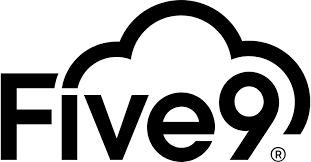 Five9
Five9
|
Five9 Chatbox: Single Interface For All Chat Channels
| 39 Reviews | |
 NICE CXone
NICE CXone
|
NICE CXOne: Digital-First Omnichannel Chat in All Channels
| 57 Reviews | |
 SnapEngage
SnapEngage
|
Transform Your Customer Engagement - Unified Customer CX
| No Reviews | |
 Zendesk
Zendesk
|
Reach Customers Instantly Via Web and Mobile
| No Reviews | |
 Drift
Drift
|
A Leading Conversation Marketing Platform
| No Reviews | |
 LiveChat
LiveChat
|
The Fastest Way To Help Your Customers
| No Reviews | |
 Intercom
Intercom
|
An Advanced Modern Messaging Products
| 27 Reviews | |
 LivePerson
LivePerson
|
AI-Powered Chatbots That Work Together with Humans
| No Reviews | |
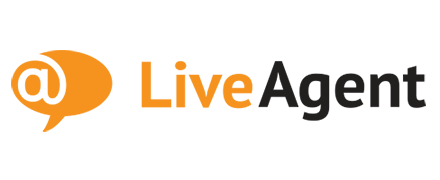 LiveAgent
LiveAgent
|
Smart Chat Routing Options Powered By Automation
| No Reviews |
- All-in-one Live Chat Solution Tailored To Fit Your Needs
- Powerful Chatbot Technology to Automate and Scale
- Advanced Routing, Team Organization, Escalation Paths
- Powerful Reporting Metrics and Analytics
- Multi-Channel Support With Facebook and Twitter
- Widget Unbranding and WebSDK for Customization
- Chatbots Automatically Book Sales Meetings
- Unique Agent Profiles to Personalize Service
- Leadbot Qualifies Leads in Real-Time 24/7
- E-Commerce Tools to Track Sales and Goals
- Default Chat Window Language Translation
- Unlimited Agent Accounts for All Plans
- Automated conversation flows with Conversation Builder
- Conversation Analytics to monitor KPIs in real time
- Enterprise-grade security, reliability, and compliance
- Simple (copy & paste) integration with your company website
- Install on your website in less than a minute
- Chat solutions can include voice and video components
Jump to ↓
- What Is Live Chat Software?
- What Are The Different Types of Live Chat Software?
- What Are The Benefits of Using Live Chat Software?
- Live Chat Software Common Features
- What Is Live Chat Software Used For?
- Best Live Chat Software
- Buying Considerations for Live Chat Software
- Live Chat Trends To Know
- Live Chat Software FAQs
What Is Live Chat Software?
Live chat software is a business communication and conversational marketing tool that powers real-time instant chat messaging between consumers and live agents, consumers and AI-powered chatbots, or a combination of the two. The goal of live chat software is to combine personalized customer service with the expediency and ease of automation.
Live chat conversations can take place on business websites, mobile apps, third-party messaging apps, or social media platforms.
Live chat software tools primarily:
- Speed up the sales process by providing buying recommendations and answers to consumer questions
- Provide AI-powered customer service and support for basic issues, and transfer more complicated support requests to live agents
- Market to first-time or returning website visitors based on their demographics or previous behavior on a business website/app
- Collect valuable customer data (contact information, etc.) and evaluate lead quality
What Are The Different Types of Live Chat Software?
Today’s live chat software has evolved far beyond the standard “Chat Now” popup windows.
Now, chat tools offer a variety of sophisticated, feature-rich solutions, each with a unique strategy to ensure both customers and agents get the most out of chat conversations.
Below, we’ll break down the different types of live chat software.
Real-Time Chat: To Provide A Human Connection
Real-time chat is a website or mobile application-based messaging solution enabling live, one-on-one conversation between website visitors (or app users) and support/sales agents.
The “human connection” is the differentiating factor here, as shown in the below image.
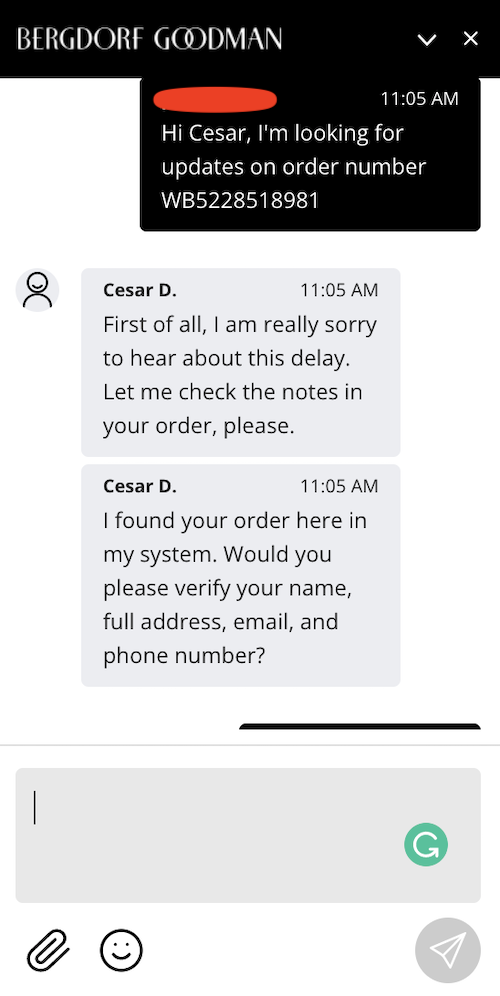
Real-time chat provides the highest level of personalization, essentially functioning just like a sales or support business phone call. Agents can share files and links, walk customers through the steps to fix a support issue, offer specific pricing quotes, or provide any other kind of individualized assistance.
Real-time chat often uses canned responses (pre-written answers to customer FAQs that live agents can copy-paste into the chat window) to expedite sales and support processes.
Automated Chatbots: To Keep More Live Agents Free
Automated chatbots (sometimes called flow-based chatbots) are self-service-focused chat tools that follow predetermined conversational paths based on the information a customer provides within the chat window.
Often, automated chatbots present customers with a list of questions or multiple choice “answer buttons” to choose from, as seen below. Answers always follow pre-written scripts and usually include links to online knowledge bases, product pages, or prewritten automated responses.
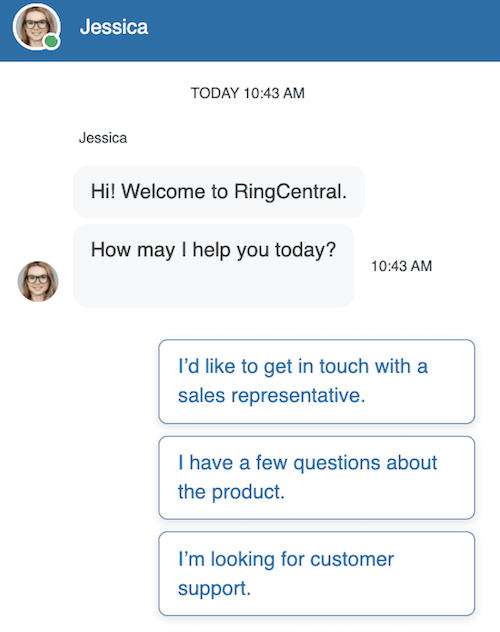
If the chatbot doesn’t “know” the answer to a question, it will either end the interaction or prompt the customer to connect with a live agent.
While certainly not ineffective, automated chatbots are somewhat limited compared to AI-powered chat tools. They’re designed to “filter out” and automate responses to basic and common customer questions.
Automated chatbots aren’t designed to handle longer, open-ended customer questions – they can only answer the questions they’ve been pre-programmed to.
Conversational AI: To Replicate A Live Conversation
Conversational AI is a smart live chat software solution that uses machine learning and Natural Language Processing (NLP) to make an automated chatbot conversation feel like a human-to-human one.
These chatbots recognize “trigger” words/phrases and analyze customer intent, customer sentiment, website visitor activity, and existing customer account information when determining how to effectively respond to customer queries.
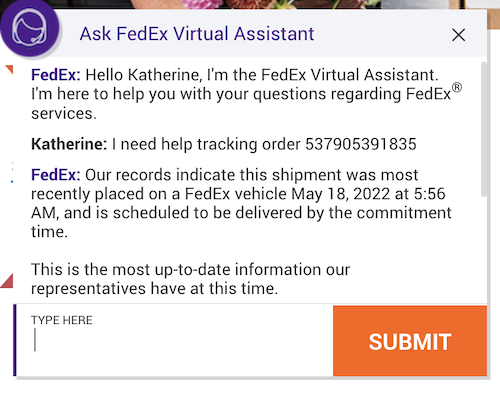
While not all chatbots use conversational AI, conversational AI is what makes it possible for chatbots to offer personalized, behavior-triggered, and higher quality live chat assistance. It helps to increase first contact resolution rates, speeds up the sales process, filters quality prospects, automates support, and prioritizes support issues that do require a live agent.
Conversational AI is also used to schedule appointments, collect payments, suggest products/services, and upsell existing customers.
Conversational Commerce: To Market To Customers Across Chat Channels
Conversational commerce is the process of using automated and real-time chat across popular messaging channels to increase customer engagement and ultimately, sell products/services directly to the consumer.
Note that although conversational commerce is primarily designed to generate sales, agents can also provide customer support across messaging channels like social media, voice and video apps, SMS texting, etc., as seen in the image below.
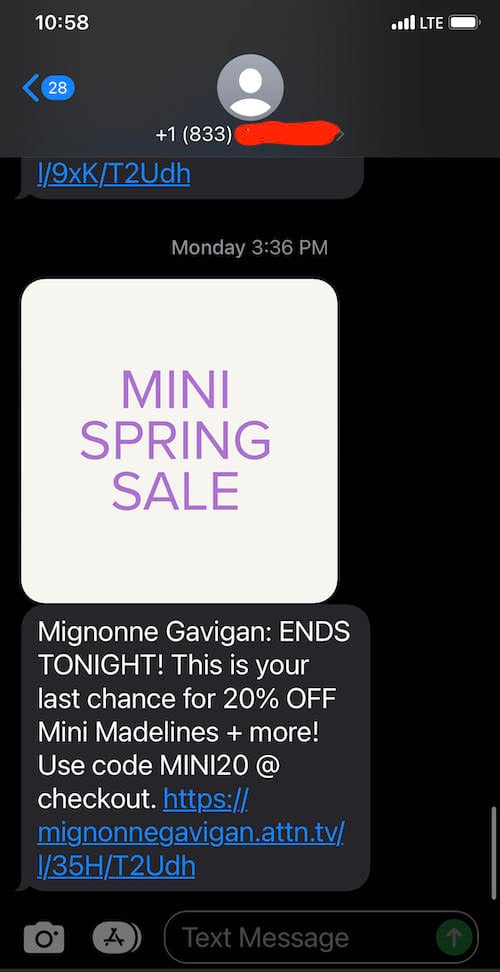
Conversational commerce lets customers and prospects communicate with businesses using popular, familiar social media messaging apps, third-party communication apps, or just by texting. This way, customers don’t have to download your business’s specific mobile app or visit your website to chat with you.
What Are The Benefits of Using Live Chat Software?
Live chat software offers a variety of benefits, from decreased operating costs and faster support resolution to higher customer retention rates and greater customer insight.
Let’s take a closer look at what your customers and your team can expect to get out of implementing conversational solutions.
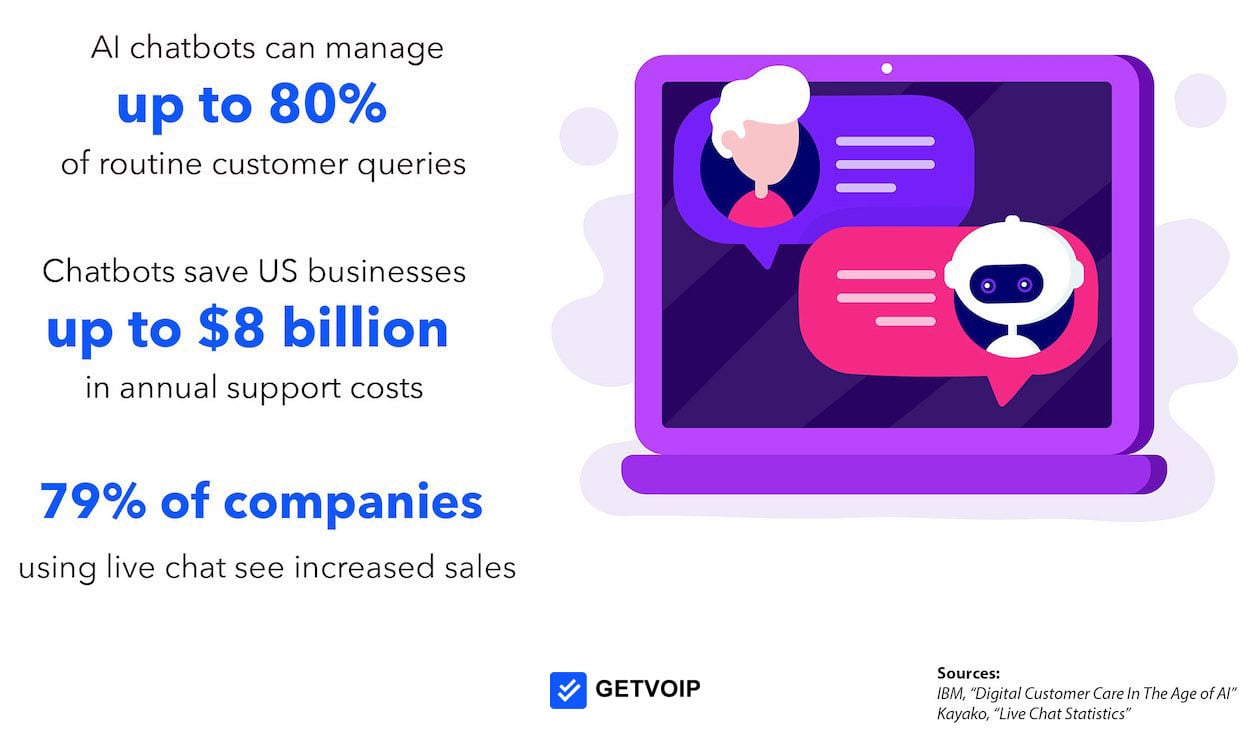
Increased Customer Satisfaction
Live chat software increases customer satisfaction by:
- Providing 24/7 “always-on” chat support/customer service
- Providing customers with chat wait time or chat queue position updates
- Empowering high-level customer self-service via AI-powered chatbots
- Letting customers choose their preferred chat channel (website, social media, WhatsApp, video, etc.)
- Offering a more personalized customer experience
- Using chat routing to ensure customers connect to the appropriate agent
Faster Support Resolution
Live chat solutions increase first contact resolution rates and speed up the overall support process by:
- Using automated AI chatbots to instantly answer common customer queries
- Giving agents access to Live Agent Assistance or pre-written canned responses in a manually searchable internal knowledge base
- Storing chat histories in shared inboxes and integrating with CRM software to prevent customers from repeating themselves to multiple agents
- Dropping links to relevant knowledge base articles, video/written tutorials, or relevant product pages in chats
- Allowing customers to fill out forms, pay bills, review order/shipping status, schedule appointments, or create support tickets directly in chat windows
- Transferring customers to live agents upon request, or setting up a time for a future live chat/call
Shorter Sales Cycles
In addition to improving the support process, live chat software can increase profits and shorten sales cycles as a whole by:
- Using analytics to determine the ideal time to proactively engage with consumers via chat
- Guiding consumers through personalized sales funnels according to chat responses
- Evaluating lead quality, passing only the most promising prospects to live agents
- Collecting key customer data
Triggering preset outbound marketing chat messages based on:
- Account status and value
- Customer demographics
- Length of time spent on website/app
- Specific website/app pages visited or specific action taken on a website/app
- If the prospect has chatted with a team member before
Agent Optimization
Live chat software is an excellent option for understaffed or newer small businesses that need to provide a higher level of customer service and support, but want to avoid having to hire additional agents.
Live chat tools also:
- Automate numerous support requests, keeping more live agents free for longer
- Automate routine business processes like data collection/account information updates
- Decrease employee turnover rates by offering a more balanced workload
- Allows agents to quickly access internal knowledge bases in-chat, without leaving the conversation
- Increase team productivity
Greater Insight Into Customer Behavior
Finally, live chat software provides almost unparalleled insight into customer behavior, demographics, pain points, and even what they’d like to see next from your business.
Admins can read stored chat logs and study chat analytics to evaluate:
- Overall support quality
- Most and least popular products or services
- Quality of employee training materials/internal knowledge bases
- Which chat channel customers prefer (Facebook Messenger, website chat, in-app chat, etc.)
- Common support issues
- Agent performance and productivity Live-Chat-Software-Features
- Effectiveness of automated chatbots and chat routing strategies
Live Chat Software Common Features
The most important live chat features any quality provider should offer are:
Conversational AI/Chatbots
Conversational AI leverages the power of Artificial Intelligence to make automated chatbot interactions feel like a real-time conversation between a live agent and a customer.
It uses Natural Language Processing, (NLP) smart analytics, and machine learning to personalize automated chat conversations on a much deeper level.
Admins can also set specific keywords/phrases that “trigger” preset responses/actions automatically. For example, conversational AI can:
- Collect customer contact and payment information
- Make product recommendations
- Schedule meetings/appointments
- Provide canned (pre-written) responses to common customer inquiries
CRM and Additional Third-Party Integrations
To personalize the live chat experience even further, ensure the provider offers in-chat CRM integration.
CRM (Customer Relationship Management) software stores and collects essential customer/account information, including contact information, order history, previous support interactions, account value, and personal notes from other agents.
Much like CRM “Call Pops” on VoIP phone systems, CRM integrations with live chat tools will show agents essential customer data when they’re chatting with a client in real-time, providing the kind of insight that makes interactions run smoothly for everyone.
Other key third-party applications, like scheduling tools or video conferencing platforms, can also be integrated into live chat tools to further streamline the communication process.
Chat Analytics
Like most business communication channels, live chat tools also offer detailed historical and real-time analytics regarding chat effectiveness, engagement, topics, and more.
In addition to completely customizable reports, most providers also offer pre-made reporting templates.
Common live chat analytics include:
- Daily/weekly/monthly number of chats
- The ratio of AI-powered automated chats: live chats
- Number of missed chats
- Average chat duration
- Lead scoring
- Number of chats per agent
- Current chat queue
- Chat ratings and customer feedback
- Ticket numbers and ticket status
- Number of available agents and live agent status
- Wait time for connecting to a live agent
- Conversions/sales/newsletter signups/other engagement generated from chat
- Types of chat interactions
Internal Knowledge Base
Today’s live chat platforms offer several tools to assist agents during real-time sales and support customer conversations. Their overall goal is to speed up the resolution or sales process by providing quick access to key information.
The most important agent assistance tool is the searchable internal knowledge database.
This instantly provides agents with the ability to find the exact information they need from internal company documentation to best assist the customer. Agents no longer need to memorize or keep customers waiting for answers to complex support queries. Instead, they can just search for what they need in the database and access canned (pre-written) responses, send customers links to relevant support pages, or provide them with step-by-step instructions.
In addition to canned responses, many internal knowledge bases will include chat scripts so agents know exactly how to handle the issue.
Some even offer Live Agent Assistance, which uses AI to determine the customer’s support/sales needs and automatically displays relevant support details to the agent. This saves agents the step of manually looking up the information.
Multiple Messaging Channels
While some may associate live chat and conversational marketing software with website chat, today’s consumers want to connect with brands on a variety of channels.
Popular live chat messaging channels include:
- Facebook Messenger, Instagram Messenger, Twitter Messenger
- SMS text messaging (Apple iMessage, Android Messages, etc.)
- WhatsApp, WeChat
- Video and voice apps
- Voice apps (Siri, Alexa, etc.)
- Video apps (Zoom, Google Meet, etc.)
Especially when working with 2 or more messaging channels, having a shared team inbox (more below) is essential.
Shared Team Inbox
A shared team inbox means that all customer queries are routed to a single department/team.
Users can view all messages in one interface, assign messages to themselves, see which messages have been assigned to other team members, view conversation histories, and even tag each other with questions.
Conversations can be categorized and filtered to ensure no messages are overlooked.
Shared inboxes prevent multiple teammates from working on the same ticket, and don’t require team members to check multiple messaging channels/platforms individually. Instead, messages from all channels are displayed in one interface.
Proactive Marketing Messaging
Proactive marketing messages allow businesses to, as the name implies, proactively engage with website/app visitors before these visitors initiate a message via the website chat tool themselves (called “reactive chats.”)
These proactive messages are completely automated, but far from random.
Admins can specify how and when the messages appear, according to any of the following factors:
- How much time a customer spends on the site
- Which web page does the customer visit (home page, product page, contact us page, etc.)
- What action a customer takes (adds an item to cart, etc.)
- How much time a customer spends on a specific page
Proactive marketing messaging often allows admins to customize their website chat interface, giving the chatbot a human profile picture, name, location, and even job title – making customers much more likely to respond.
What Is Live Chat Software Used For?
Live chat software has a wide variety of use cases across many business sectors like eCommerce, tech support, healthcare, and marketing/consulting.
eCommerce chat software can:
- Make product recommendations
- Provide information about sizing or product warranties
- Provide order status and shipping updates
- Proactively send out promo codes
- Identify quality leads
- Remind customers about items left in carts
Customer support teams use live chat tools to:
- Automate simpler support requests
- Verify or update account information
- Direct customers to relevant internal knowledge base articles or video tutorials
- Flag serious support issues for live agent conversations and collect information the agent will need (account number, product type, issue description, order number, etc.)
- Help customers schedule in-person service/support appointments
- Co-browse and screen share with customers to completely resolve issues
Service providers like salons, home repair/installation specialists, etc. use chat tools to:
- Direct customers to download their branded app
- Make appointment bookings/show available time slots
- Provide quotes and pricing
- Collect customer information
- Set reminder notifications
- Help customers add appointments to their calendar apps
- Offer upgrades
- Share photos/information packets on available services
- Ask for customer feedback and reviews
Marketing teams use chatbots to:
- Send out customer surveys
- Make proactive sales recommendations/engage in conversational marketing
- Automate lead follow-up
- Get more detailed information about target markets/customer demographics
- Analyze customer-agent conversation transcripts
- Collect prospect contact information
- Encourage visitors to sign up for e-newsletters/mailing lists
Healthcare providers can use chatbots to:
- Schedule virtual or in-person appointments
- Guide patients through filling out medical forms
- Answer patient questions about insurance coverage
- Collect patient payments
- Share links to telehealth appointment video sessions
Best Live Chat Software: Detailed Breakdown
The table below provides a quick overview of some of the best live chat software on the market today. We’ll evaluate each provider in more detail in the following sections.
| Provider | Pricing | Top Feature | Best For |
| LivePerson | – 1 Free Plan
– 1 Paid Plan From $599.00/month for up to 10 users and 2,000 Conversations/Month – Custom Quotes Available – 45-Day Free Trial |
Intent Manager | Mid-to-enterprise-level corporations with a high daily chat volume across channels that require advanced AI-powered automated responses to manage efficiently |
| Drift | – 3 Quote-Based Plans | Chat Playbooks | Mid-to-large eCommerce retailers looking to expand target markets and automate support processes to keep up with sudden increased customer demand |
| LiveChat | – 4 Paid Plans from $16.00-$50.00+/agent per month
– 14-Day Free Trial |
Multi-channel chat messaging (website, Facebook Messenger, SMS, WhatsApp, Apple Business Messages, email, video, voice) | Teams that view chat messaging as their primary sales channel (including social media messaging) |
| Intercom | – Quote-Based, From $74.00/month
– 14-Day Free Trial |
Interactive Product and Support Tours | SMBs focused on high-level personalization and increased customer self-service via third-party integrations |
| LiveAgent | – 1 Free Plan
– 3 Paid Plans from $15.00-$49.00/User/Month – 14-Day Free Trial |
– Universal Inbox and Hybrid Ticket Stream | Small teams and solopreneurs that are looking for a free help desk solution offering live chat, and as such, don’t require advanced AI-powered chat communications or a robust feature set |
LivePerson
LivePerson Conversational Cloud is a live chat software platform that relies on industry-leading sentiment analysis to anticipate – not simply respond to – customer intent, engaging with consumers on a Curiously Human™ level.
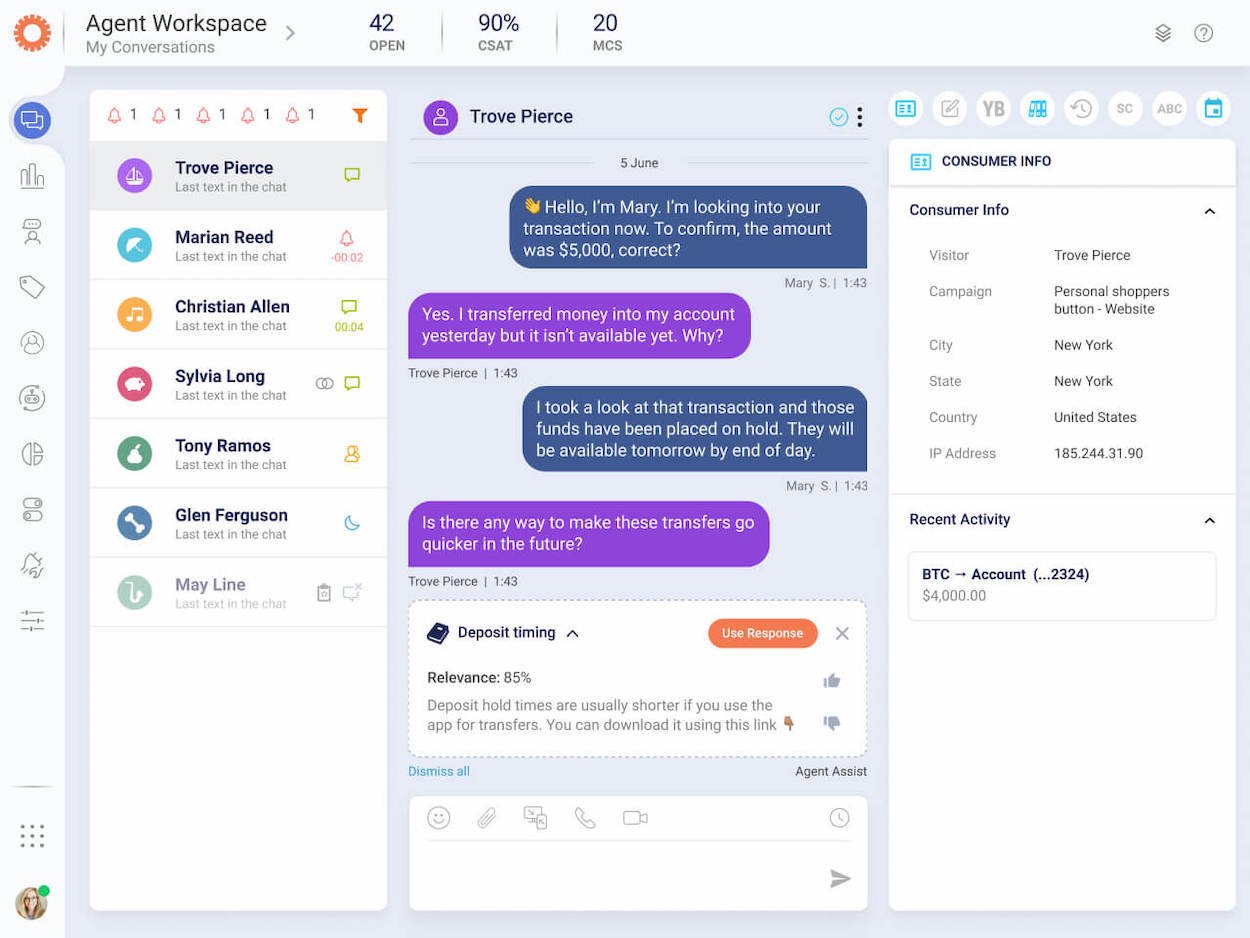
LivePerson’s ability to perfectly emulate natural (human) conversation is so uncanny that Fast Company named it the world’s number-one most innovative AI company in 2022. Thanks to over 20 years of experience and more than 1 billion monthly chat conversations to analyze, LivePerson’s NLP and NLU have one of the highest F-scores (machine learning accuracy ratings) in the industry.
The platform has tailored live chat solutions for both conversational Commerce and conversation-based Customer Care. Customers can choose their preferred chat/communication channel and seamlessly switch between them thanks to automated omnichannel asynchronicity. Businesses and consumers can connect on (among other channels) website chat, SMS texting, WhatsApp, WeChat, email messaging, in-app messaging, Twitter and Facebook Messenger, Apple Business Chat, Google Business Messenger, and even transition from voice calling to messaging.
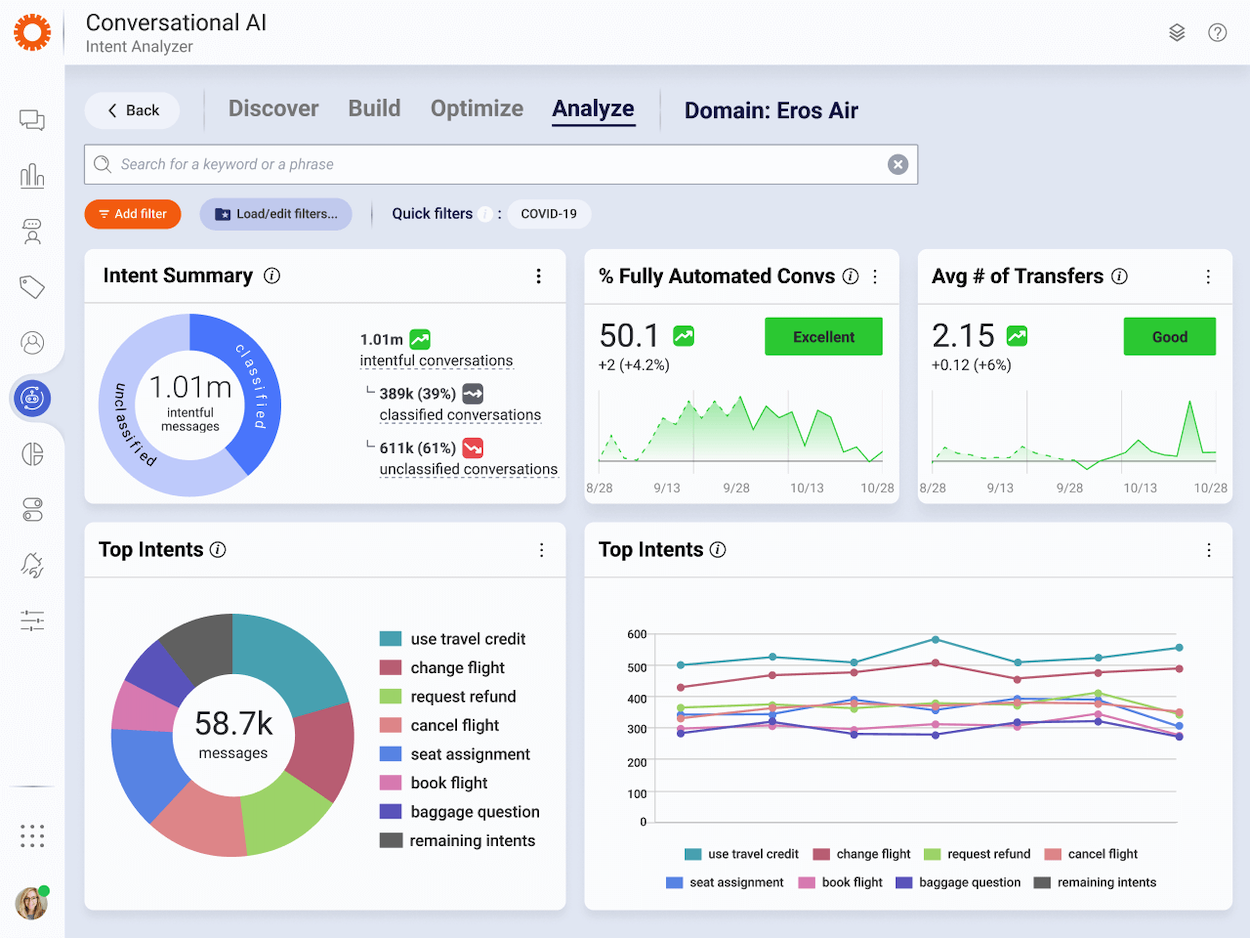
Intent Manager is easily LivePerson’s standout feature, constantly analyzing and creating more accurate and efficient automated chat responses to your business’s most common chat queries (order status, product availability, shipping details, returns, installation/setup help, etc.) Data from the Intent Manager informs the Conversation Builder, a drag-and-drop automated response generator that combines NLU/NLP analytics with script/conversation input from top human agents.
LivePerson Pricing
The below image shows some of the available LivePerson pricing options.
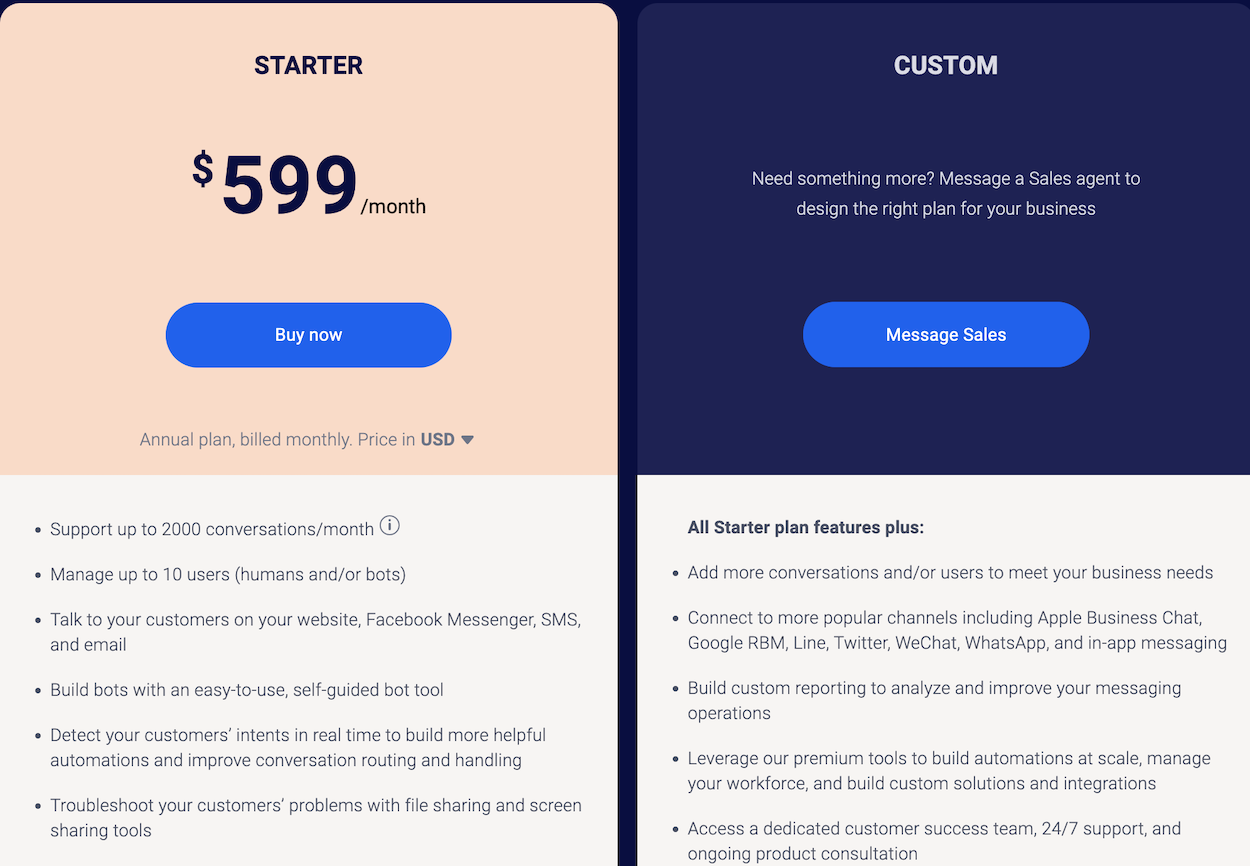
LivePerson Pros and Cons
The pros and cons table below outlines the LivePerson user experience.
| LivePerson Pros | LivePerson Cons |
| Channel-agnostic payments mean customers don’t have to re-enter payment details across different messaging channels, decreasing cart abandonment rates | Though LivePerson offers a free 45-day trial, it is quite expensive, with plans for 10 users starting at $599.00/month – plus an additional $39.00 for a bundle of 100 conversations if users exceed the 2,000 monthly maximum |
| In-chat Conversation Assist lets agents drag and drop preset responses across messaging channels – while also giving agents the option to “Delegate” the support or sales ticket to a bot (agents receive a notification when the bot completes the interaction) | Expect a high learning curve given the volume of features – especially for agents unfamiliar with all chat messaging platforms. |
| Robust analytics include LivePerson’s Meaningful Automated Conversation Score (MACS) to evaluate and improve bot effectiveness with machine learning while flagging interactions needing human review | Several users report problems with successfully exporting complete chat transcripts |
| Integrations with key third-party tools like Shopify, Salesforce, SugarCRM, Microsoft Dynamics, and other third-party, in-chat bots (plus an enormous API selection from the LivePersondeveloper community) | As of this writing, LivePerson does not offer live video calls in chats or internally (but does have a video calling tool in development) |
Who Should Use LivePerson?
LivePerson is best for medium to enterprise-level companies that want the benefits of a large-scale in-house developer team without having to hire new employees. The platform is clearly designed for businesses that have a high number of daily chat interactions that need to automate as much as possible – without compromising the quality of service. LivePerson users will always attempt to resolve chat communications with AI-powered bots first, and see live agent-to-consumer chat as a backup option. LivePerson is especially known for its entry into the Decentralized Finance (cryptocurrency) space, as well as its specific solutions for the automotive and healthcare industries.
Drift
Drift is a live chat solution primarily focused on leveraging AI-powered conversational marketing to improve lead capture and shorten the sales cycle.
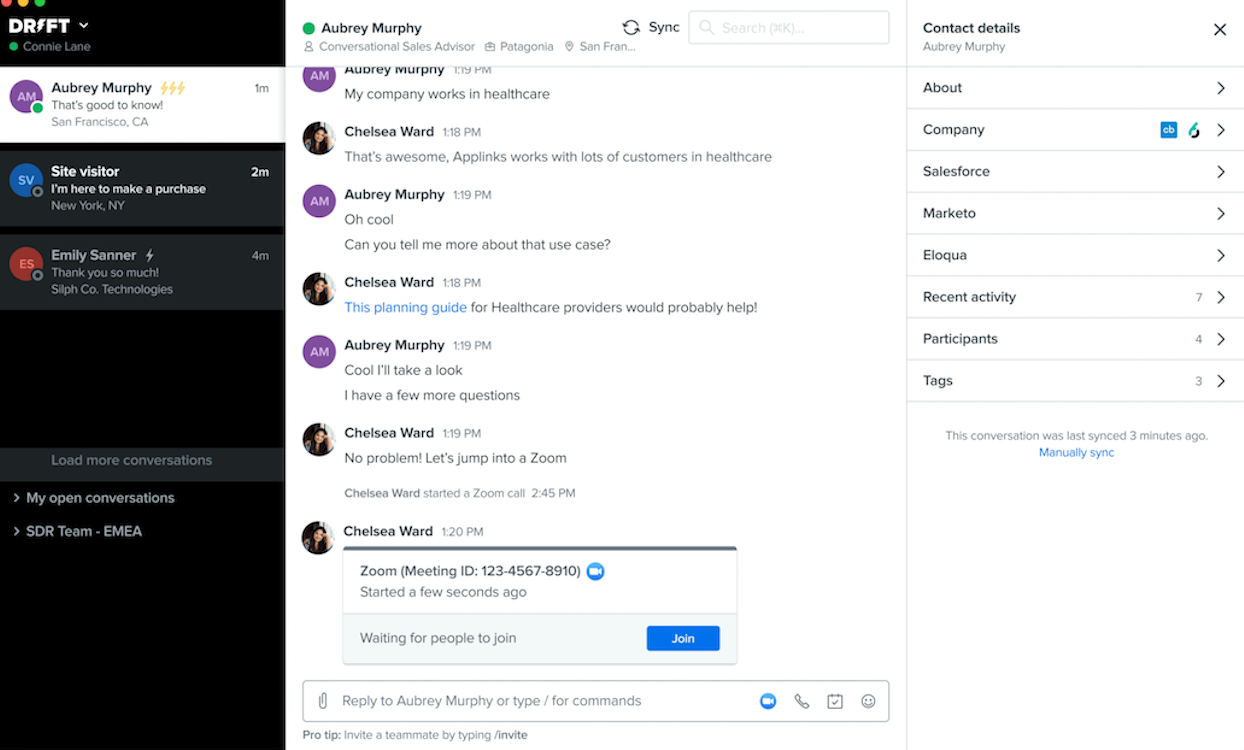
Its Revenue Acceleration Platform facilitates more effective communication between customers and agents as well as sales and marketing teams, identifying and eliminating common sales and support roadblocks.
Drift’s automated sales chatbots, called Virtual Selling Assistants, offer 24/7 engagement, analyze customer responses to identify promising leads and provide basic customer support through canned responses and two-way CRM integration.
Drift Pricing
The image below offers insight into the different features included with each Drift plan, but specific pricing is available only on a quote basis.
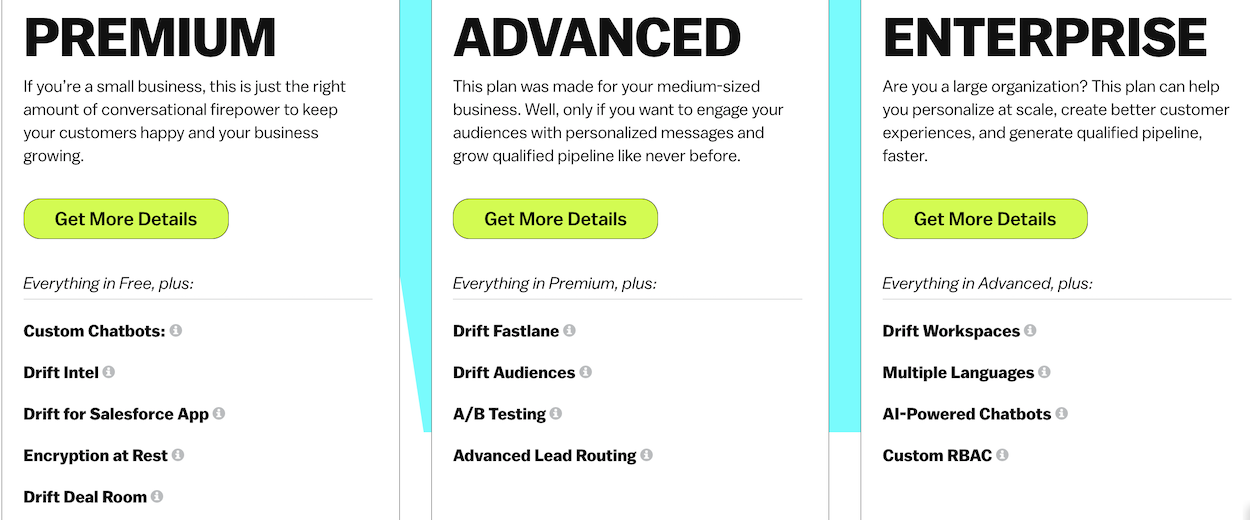
Drift Pros and Cons
The pros and cons table below outlines the Drift user experience.
| Drift Pros | Drift Cons |
| Chat Playbooks feature includes advanced targeting options, providing more accurate visitor intent analysis and lead qualification | Conversational Rating tool (post-chat customer survey) is not customizable, the only available survey question is “Hey, how’d I do today?” |
| Fastlane feature identifies VIP customers or high-quality leads, offering instant live agent meetings or meeting scheduling with pre-filled, personalized forms | Some key features, like Virtual Selling Assistants and multilingual chat, are available only as paid add-ons or on the most expensive plan |
| Live agents can instantly transition from chat messaging with a lead to a telephone call or Zoom video conference | Though Drift offers a high level of automated personalization, some customers will likely find it invasive or “pushy” |
| Robust two-way integrations with key tools like Salesforce, Salesloft, Marketo, Zendesk, HubSpot, Google Analytics, etc. | Drift’s customer support chatbot is unhelpful and restrictive – the chatbot did not allow us to type in a unique message, and instead forced us to choose between several sales-driven options |
Who Should Use Drift?
Drift is best for established mid-to-enterprise level eCommerce shops/retailers that want to expand their target market while implementing more efficient sales and support processes to meet growing customer demand.
LiveChat
LiveChat is an omnichannel messaging platform and customer service solution with a particular focus on optimizing one-on-one live agent chat between customers and sales/support teams.
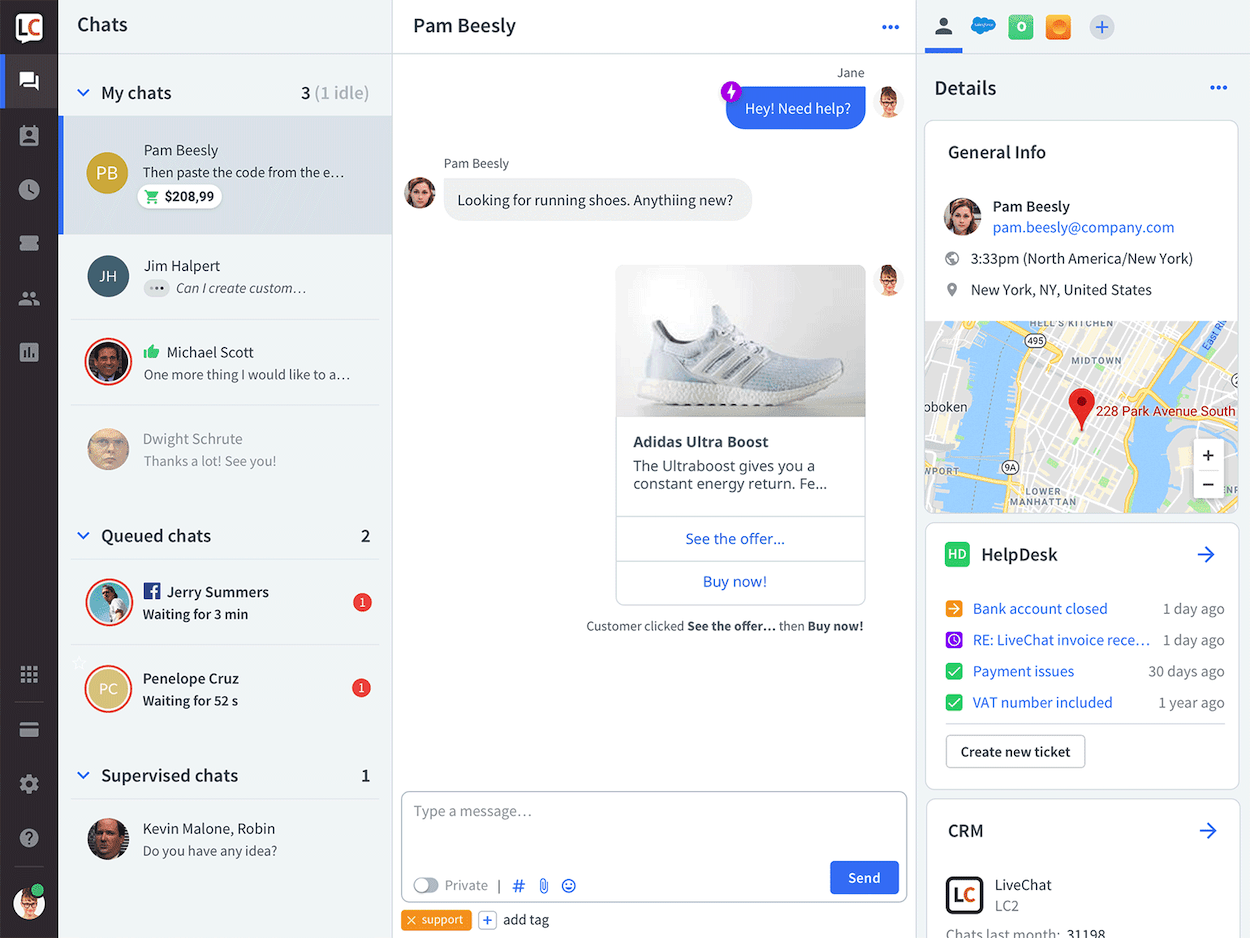
It’s hard to sum up the incredibly feature-rich LiveChat in a few sentences, but with numerous communication channels like website chat, Facebook Messenger, WhatsApp, Apple Messages for Business, email, video, voice, and SMS plus real-time chat notifications, live communication has never been more convenient for both agents and customers.
Features like agent chat widgets, message translation in 45+ languages, in-chat filing sharing, and searchable canned response libraries keep real-time chats efficient while providing an almost unparalleled level of personalization.
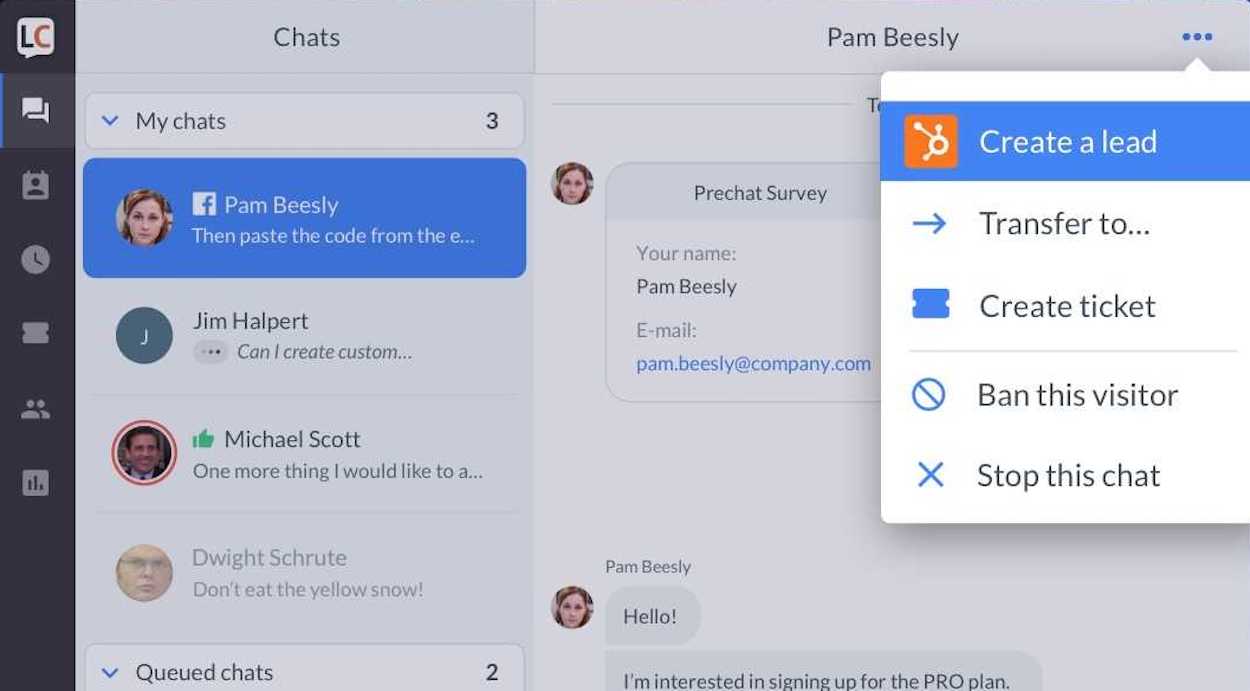
All chats are automatically archived, searchable, and can even be organized by tags and filters like agent name, customer location, and returning visitors.
Chat queues, chat transfers and routing, and in-chat features like clickable customer response buttons and image and product description carousels further optimize the individual live chat experience.
LiveChat Pricing
The below image offers a quick overview of available LiveChat pricing and plans.
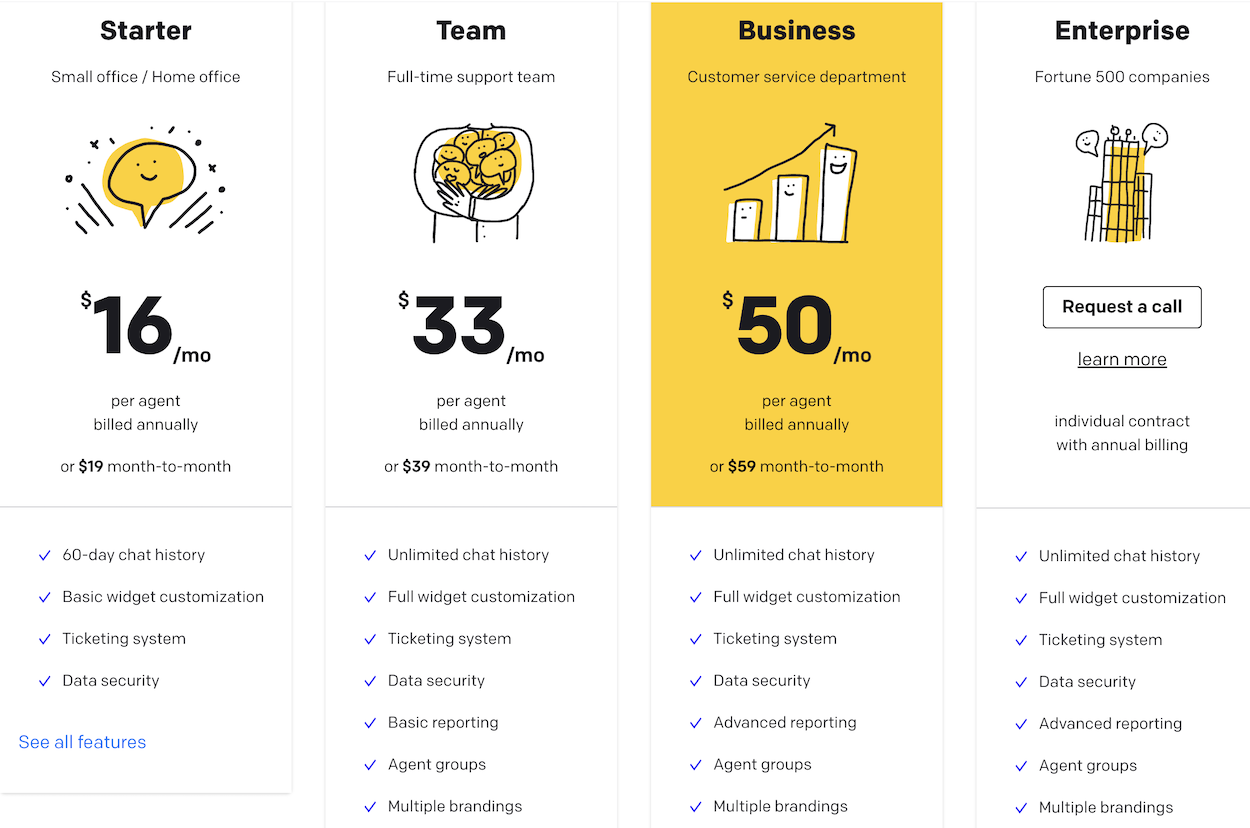
LiveChat Pros and Cons
The pros and cons table below outlines the LiveChat user experience.
| LiveChat Pros | LiveChat Cons |
| Fast and easy installation+setup process just requires copy-pasting LiveChat code to your business website | Given the high number of features, expect LiveChat to come with a high learning curve (even with its clean, intuitive interface) |
| Message Sneak Peeks let agents see what customers are typing before they hit send, giving agents extra time to have all the information they need without keeping a customer waiting | Even with an omnichannel unified interface, LiveChat offers so many different communication channels it’s easy for some chats to get overlooked or for agents to become overburdened |
| Account owners can add the LiveChat widget to an unlimited number of websites and apps with 1 license | Though some automations are available, LiveChat is not as AI-heavy as other real-time chat software, so it may not be right for teams reliant on automation to speed up business processes |
| Custom Chat APIs, 200+ integrations, thriving developer community | Some key features, like chat tagging, live chat takeover, and agent activity analytics are only available on more expensive plans |
Who Should Use LiveChat?
LiveChat is best for businesses of any size that want to make real-time chat messaging their primary customer support channel and therefore require feature-rich software. These businesses likely see a high number of leads from social media and third-party messaging tools like Facebook and WhatsApp and need them to integrate into a more robust chat messaging solution.
Intercom
Intercom Is a customer communications platform designed to engage with consumers at every part of their customer journey, using key insights from past conversations, set rules, and customer data to personalize live and automated conversations.
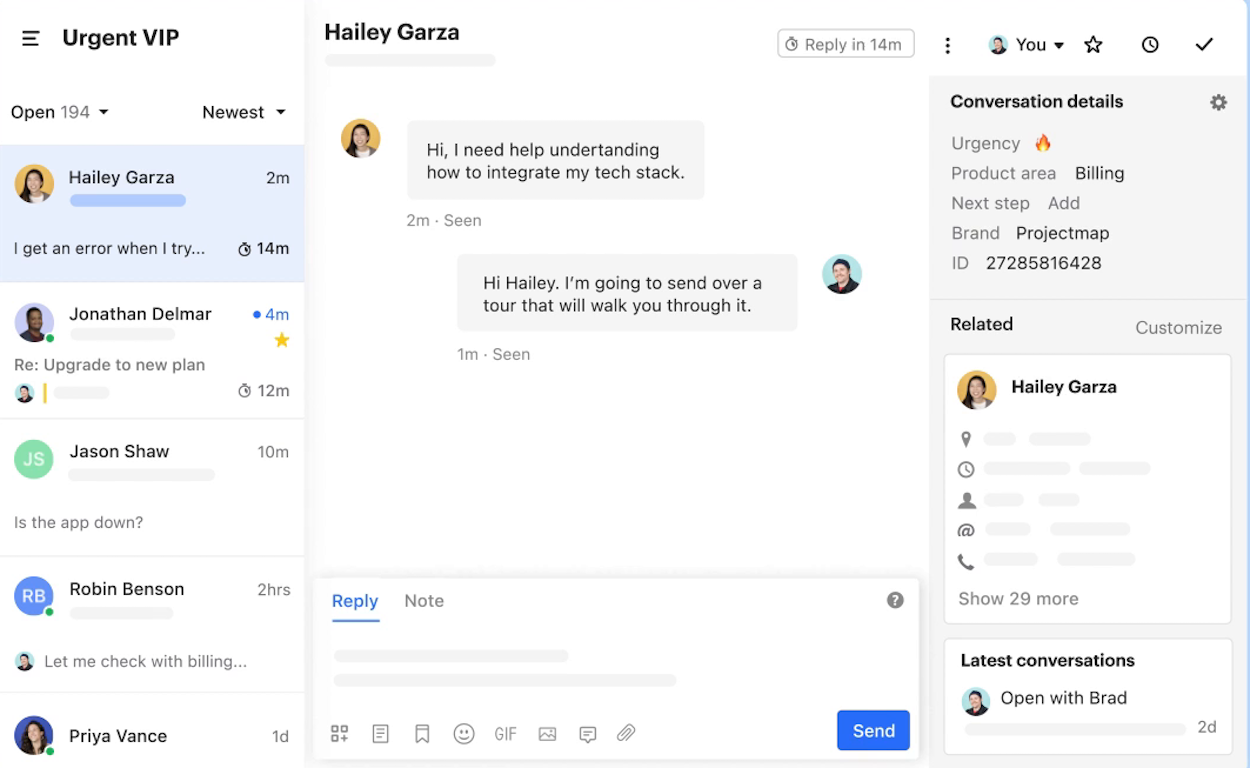
It offers three separate conversation-based products: Conversational Marketing, Conversational Engagement, and Conversational Support.
The Intercom Business Messenger is a single unified inbox for all communication channels, offering proactive outbound messaging, live two-way chat, automated self-service, customizable chatbots, and team performance reporting.
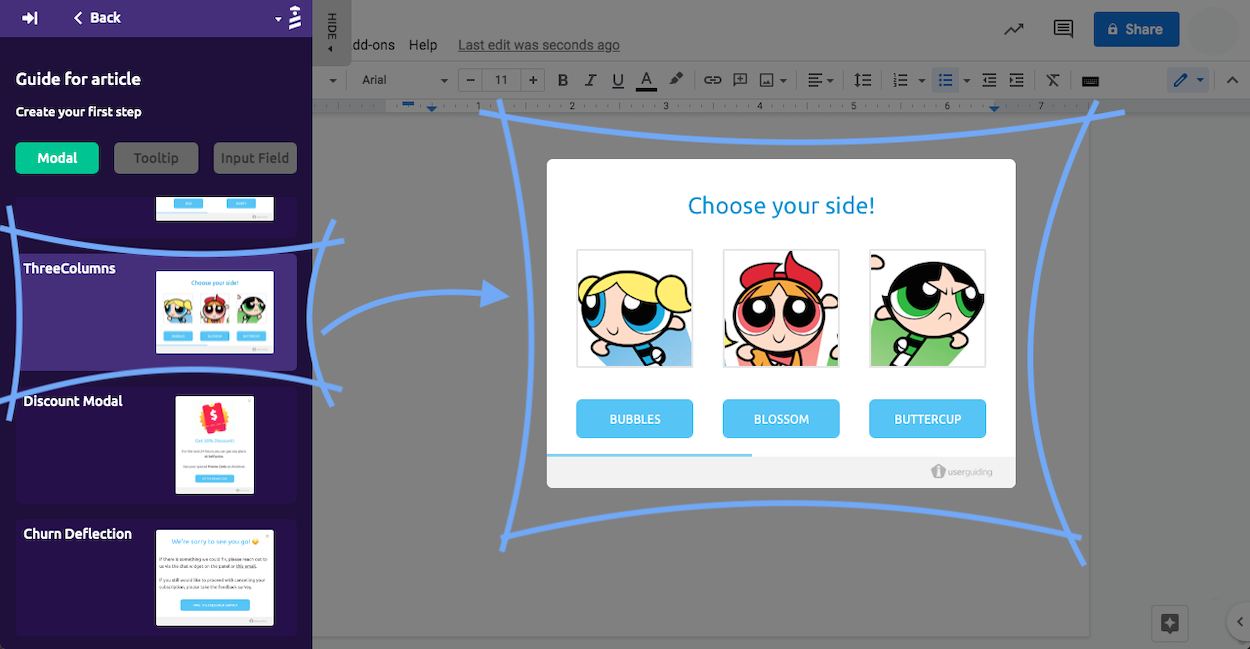
Intercom’s interactive tour feature automatically suggests relevant product/service tours by user intent and decreases resolution times via self-guided, multi-page customer support tours. Customer support or sales video tours are also available, allowing agents to make a face-to-face connection with key clients or promising leads.
Targeted proactive outbound messaging uses customer data to anticipate upcoming support/sales needs, keeping the agent workload balanced. Proactive sales messaging re-engages with users who haven’t yet made a purchase or set an appointment, ensuring valuable leads don’t slip through the cracks.
Intercom Pricing
The below image shows the available Intercom plans, but exact pricing is given via direct quote only.
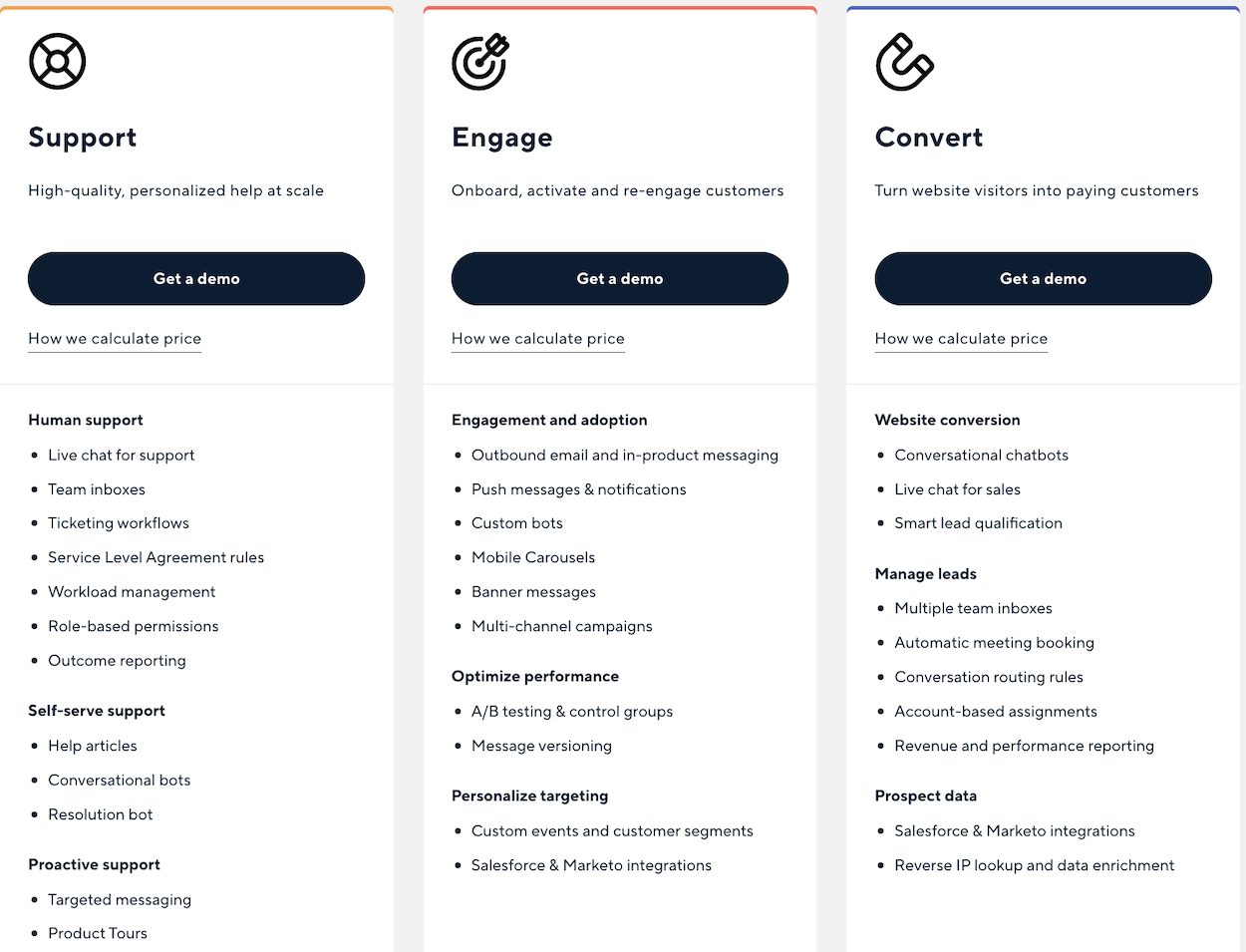
Intercom Pros and Cons
The pros and cons table below outlines the Intercom user experience.
| Intercom Pros | Intercom Cons |
| Exceptional level of third-party integrations (300+) allows customers and agents to use third-party tools like Google Calendar, Salesforce, Stripe, Zoom, Outlook, etc. within a live chat | Since the Conversational Engagement, marketing, and Support Plans are separate, businesses are usually forced to purchase multiple plans to ensure all customer needs are met |
| Advanced features for businesses with a mobile app, including in-app messaging with real-time push notifications, Mobile Carousels to increase engagement, and a mobile-first chat experience | Confusing to determine which specific features and functionalities are a part of which plan, and the pricing page doesn’t offer much insight |
| The Resolution Bot (an automated self-service chatbot with machine learning) keeps agents free by solving about 33% of all customer queries via 24/7 support | Some aspects of the online Intercom knowledge base require users to sign up for a free trial to access, meaning more detailed insight into specific feature capabilities is unavailable |
| Automated chatbots offer a higher level of customization than competitors (personalization according to customer spend, page view, level of urgency and customer value, location, specific customer segment, etc.) | Some key features like Resolution Bot, Product Tours, Message tagging, and WhatsApp integration require paid add-ons |
Who Should Use Intercom?
Intercom is best for SMBs needing to automate as many business processes as possible without sacrificing a high level of personalization – something that Intercom’s incredibly detailed customer insights and analytics tools make possible. It’s also ideal for app-based products and services needing in-app communication.
Teams using Intercom may not be able to hire the number of agents they need to keep up with inbound chat messaging rates, and therefore need a live chat solution that prioritizes automated customer self-service. As such, these teams will also need chat software with a level of integration with key scheduling apps, CRM tools, and eCommerce platforms.
LiveAgent
LiveAgent is an all-in-one omnichannel helpdesk software offering live human-to-human chat across multiple messaging apps, social media platforms, and other communication channels.
LiveAgent’s Universal Inbox/Hybrid Ticket Stream is easily its standout feature.
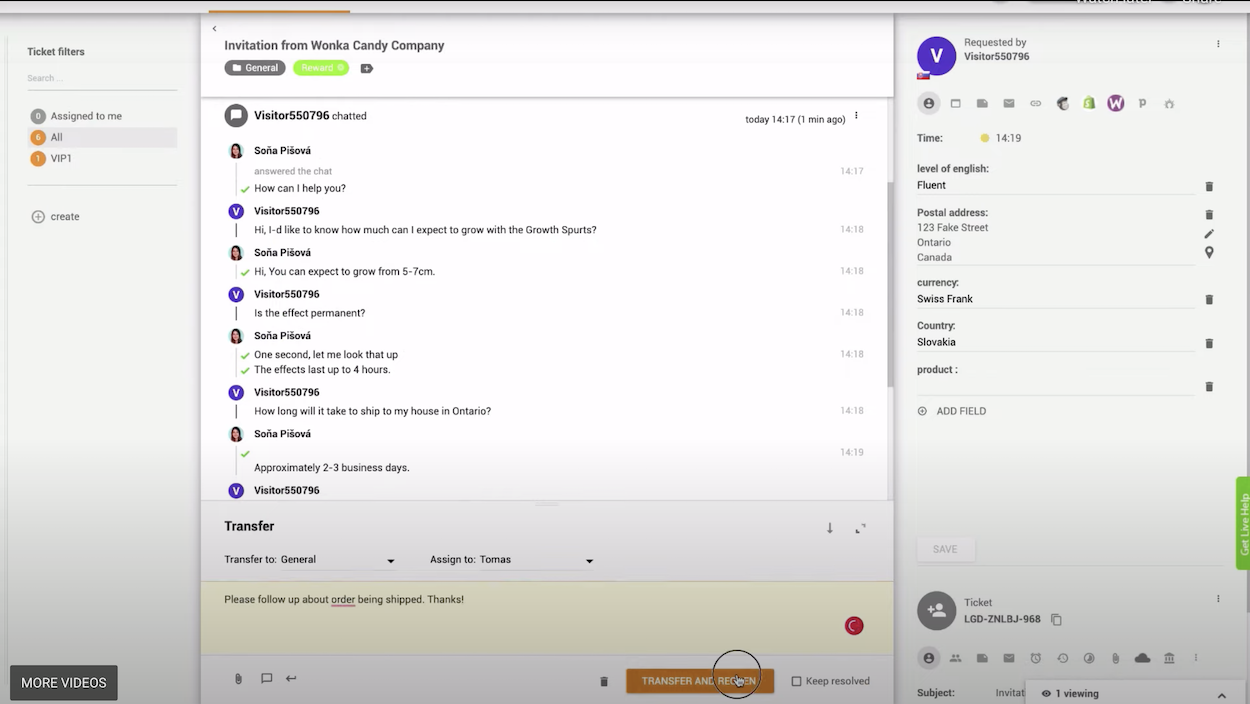
It is a shared inbox that streamlines and syncs all communication channels – not just chat messaging platforms – into a single interface with real-time syncing and shared user access, so multiple agents can work within the inbox simultaneously.
The Universal Inbox allows agents to review all prior interactions with a customer (regardless of the communication channel) in addition to live visitor analytics, account overview information, the total length of time the issue has been open, current status, and its priority level.
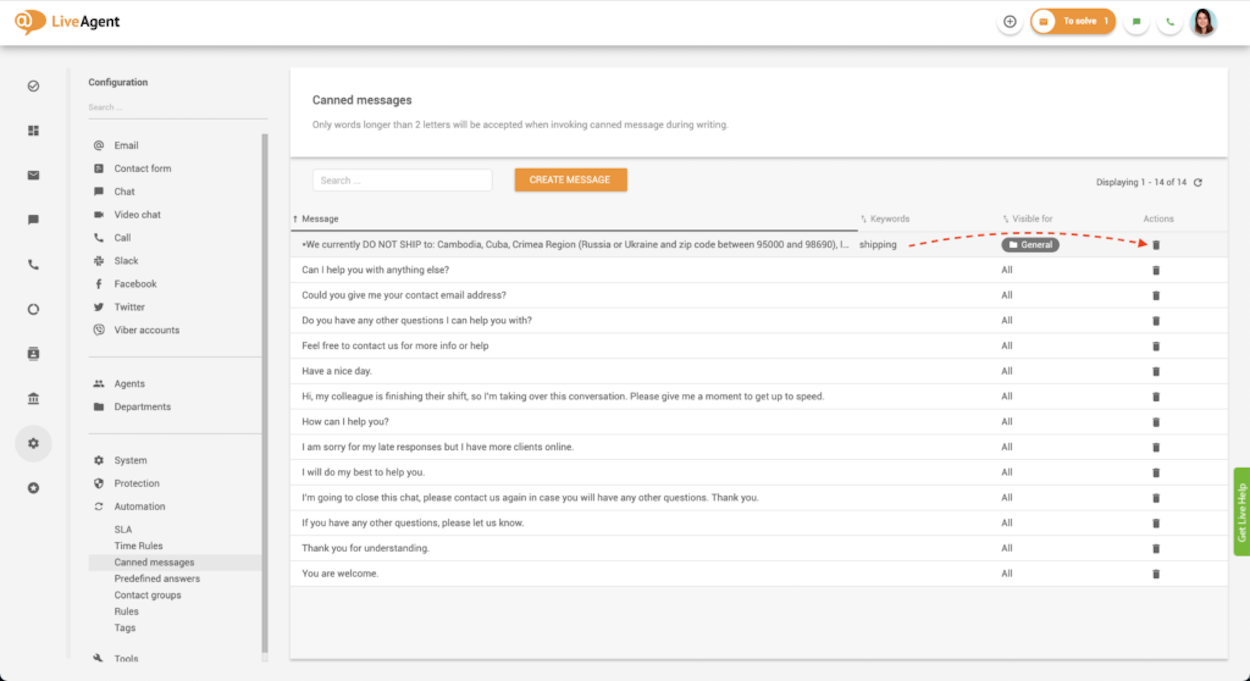
Agents can also engage in real-time, two-way communication with visitors and customers directly in the inbox – and via multiple channels. They can include attachments and GIFs, in their chat messages, transition the chat to an email conversation or phone call, and assign chats to other agents. Ticket automation makes it easy to transform a chat message into a support ticket, and assign it to the appropriate agent with pre-set routing rules.
LiveAgent Pricing
The below image shows some available LiveAgent pricing and plans.
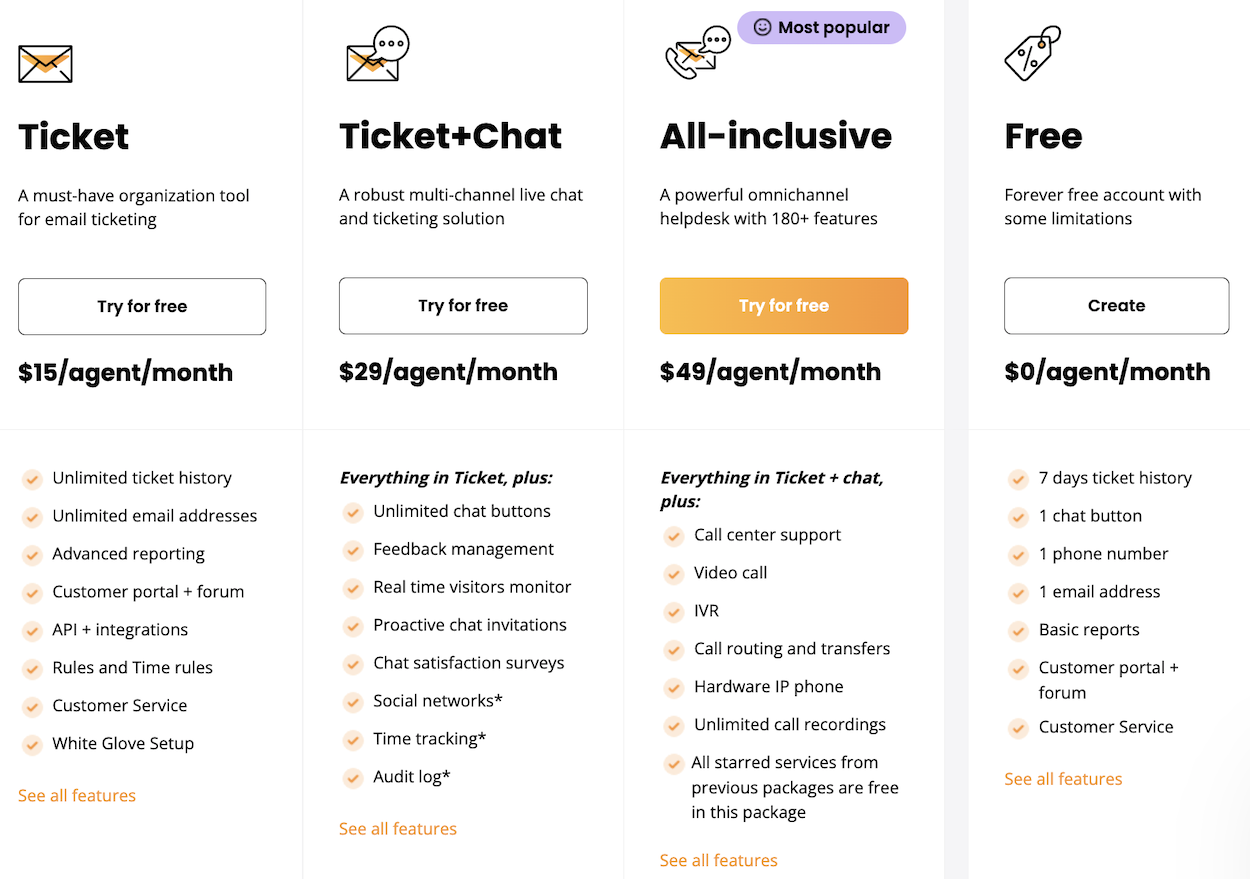
LiveAgent Pros and Cons
The below pros and cons table outlines the LiveAgent experience.
| LiveAgent Pros | LiveAgent Cons |
| In addition to transparent pricing, LiveAgent offers a free plan with a 7-day ticket history, 1 chat widget, 1 email, 1 phone number, and basic reporting – with no cancellation fees or contracts for paid plans | Because LiveAgent bills itself first as an all-in-one helpdesk software, not a standalone live chat provider, expect fewer live chat features than other providers covered here |
| Integrates with over 200 third-party solutions, including Mailchimp, Zapier, Squarespace, Google Analytics, Shopify, Salesforce, and WordPress | Some essential messaging platforms like Facebook, Instagram, Twitter, and Viber require an additional payment of $39.00/month per platform, per account on all but the most expensive LiveAgent plan – and a native WhatsApp integration is not available with LiveAgent |
| 24/7 customer service available by LiveAgent website chat, phone, email, social media messaging | As the name implies, LiveAgent prioritizes human-to-human conversation – so while standard live chat features like internal knowledge bases and canned responses are included, users will not have access to native AI chatbot capabilities, just basic automations |
| Live chat maximum queue length feature lets admins limit chat wait times for customers, automatically changing the chat widget to “offline” or making the chat function invisible to website visitors until the queue is manageable (visitors prompted to pre-fill contact forms instead) | The pricing page makes it difficult to tell which features are included in which plans, and whether or not LiveAgent currently offers all the features listed, has them in beta, or plans to offer them in the future |
Who Should Use LiveAgent?
LiveAgent is best for smaller businesses and solopreneurs that need a free customer support center offering live chat – and that don’t need an excessive amount of features or high-powered AI chatbots. If they do upgrade to a paid plan, LiveAgent users want to be able to cancel their service at any time without incurring early termination fees. LiveAgent is ideal for teams that need to leverage customer self-service options like online knowledge bases, FAQs, and community forums because they lack the number of agents needed to address a high volume of requests.
Buying Considerations for Live Chat Software
Now that you know more about what live chat software is, its key features, common use cases, and top providers, consider what you should look for in live chat software.
While pricing is important, in the long-term, a provider’s scalability, add-on features, plan tiers, and whether they offer monthly billing or require a long-term contract with hefty early termination fees may matter even more.
Ask providers about guaranteed uptime, (99.9% is the minimum) data center locations, geographic redundancy, and the level and availability of provider support. Review the platform’s overall ease of use and intuitiveness – is this something that your team can pick up quickly, or will learn how to use it require a lengthy training process?
What about the mobile versions of these chat tools? Which features do mobile versions include, and which do they leave out? Are they compatible with your existing mobile devices and both iOS and Android Operating Systems?
Above all, ensure that the provider you select integrates with any existing third-party apps and software your team will continue to use – and that it grants access to all the chat channels you need to connect with your customers.
Live Chat Trends To Know
The future of live chat software is bright – and rapidly evolving.
As voice bots and virtual home assistants like Alexa, Siri, and Google Assistant become common household items, expect to see chatbot support increasingly involve voice communication, in addition, to typed chats.
However, consumers aren’t just interested in voice bots that read off paragraphs of information in a monotone voice. Instead, they want the same two-way conversation they have with chatbots, translated to the voice bot experience.
Two-way, real-time customer communication – whether via voice bot or chatbot – needs to mimic the natural flow of real conversation. This means AI features like sentiment analysis, customer personalization, and multilingual understanding will play a huge role in future chat tools.
Finally, don’t expect live chat software to primarily serve just your customers in the future.
Soon, your employees will rely on internal chatbots to automate routine business processes, schedule shifts and days off, find relevant customer information, and more.
Live Chat Software FAQs
Below, we’ve answered some popular FAQs about live chat software.
Use our SoftwareMatch tool to get started with live chat software
Instantly compare live chat offers from award-winning providers.
“GetVoIP’s comparison guides made it easy to summarize services and make an informed and cost-effective decision.”
